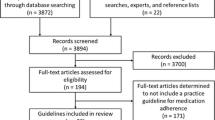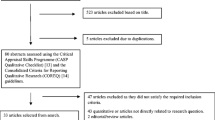Abstract
Purpose
Non-adherence to chronic medication remains an important problem with vast consequences and without solutions to date. Nurses are well positioned to provide adherence care, yet currently represent an underutilised force in improving adherence and outcomes. This review aims to synthesise the effect of nurse-led interventions on adherence to chronic medication.
Methods
Using Review Manager software, a meta-analysis was conducted. The search term medication adherence was combined with random* and nurse in PubMed and ISI Web of Knowledge. Retrieved articles’ reference lists were hand searched. Included were randomised controlled trials on nurse-led interventions, aiming to improve chronic medication adherence. Articles were to be in English and published from 2006 to 2011. Quality was assessed using an adapted version of the CONSORT tool.
Results
Ten studies met the selection criteria, seven of which were on HIV-positive patients. Their quality was acceptable to high. Counselling was the intervention most frequently assessed, mostly given face-to-face, but also in groups and via electronic messages. All interventions enhanced adherence. Of the five studies reporting adherence as mean percentage of adherence, pooled mean differences were +5.39 (1.70–9.07) (short term) and +9.49 (4.68–14.30) (long term), favouring the intervention groups. Of the studies reporting adherence dichotomously, odd's ratios were 1.55 (1.04–2.29) (short term) and 1.87 (1.35–2.61) (long term). The longer counselling was effectuated, the better the results.
Conclusions
Counselling appears to be an effective approach that nurses can use to supplement other methods, building a multifaceted strategy to enhance adherence. Tackling non-adherence seems to demand continuous efforts and follow-up.



Similar content being viewed by others
References
Simoni JM, Chen WT, Huh D, Fredriksen-Goldsen KI, Pearson C, Zhao HX, Shiu CS, Wang X, Zhang FJ (2011) A preliminary randomized controlled trial of a nurse-delivered medication adherence intervention among HIV-positive outpatients initiating antiretroviral therapy in Beijing, china. AIDS Behav 15(5):919–929. doi:10.1007/s10461-010-9828-3
de Bruin M, Hospers HJ, van Breukelen GJP, Kok G, Koevoets WM, Prins JM (2010) Electronic monitoring-based counseling to enhance adherence among HIV-infected patients: a randomized controlled trial. Health Psychol 29(4):421–428. doi:10.1037/a0020335
DiIorio C, McCarty F, Resnicow K, Holstad MM, Soet J, Yeager K, Sharma SM, Morisky DE, Lundberg B (2008) Using motivational interviewing to promote adherence to antiretroviral medications: a randomized controlled study. Aids Care-Psychol Socio-Med Asp Aids-Hiv 20(3):273–283. doi:10.1080/09540120701593489
Koenig LJ, Pals SL, Bush T, Palmore MP, Stratford D, Ellerbrock TV (2008) Randomized controlled trial of an intervention to prevent adherence failure among HIV-Infected patients initiating Antiretroviral therapy. Health Psychol 27(2):159–169. doi:10.1037/0278-6133.27.2.159
Holzemer WL, Bakken S, Portillo CJ, Grimes R, Welch J, Wantland D, Mullan JT (2006) Testing a nurse-tailored HIV medication adherence intervention. Nurs Res 55(3):189–197. doi:10.1097/00006199-200605000-00005
Williams AB, Fennie KP, Bova CA, Burgess JD, Danvers KA, Dieckhaus KD (2006) Home visits to improve adherence to highly active antiretroviral therapy: a randomized controlled trial. J Acquir Immune Defic Syndr. 42(3):314–321. doi:10.1097/01.qai.0000221681.60187.88
Simon GE, Ralston JD, Savarino J, Pabiniak C, Wentzel C, Operskalski BH (2011) Randomized trial of depression follow-up care by online messaging. J Gen Intern Med 26(7):698–704. doi:10.1007/s11606-011-1679-8
Guirado EA, Ribera EP, Huergo VP, Borras JM, Grp A (2011) Knowledge and adherence to antihypertensive therapy in primary care: results of a randomized trial. Gac Sanit 25(1):62–67. doi:10.1016/j.gaceta.2010.09.015
Homer D, Nightingale P, Jobanputra P (2009) Providing patients with information about disease-modifying anti-rheumatic drugs: Individually or in groups? A pilot randomized controlled trial comparing adherence and satisfaction. Musculoskelet Care 7(2):78–92. doi:10.1002/msc.141
Sarna A, Luchters S, Geibel S, Chersich MF, Munyao P, Kaai S, Mandaliya KN, Shikely KS, Temmerman M, Rutenberg N (2008) Short- and long-term efficacy of modified directly observed antiretroviral treatment in Mombasa, Kenya: a randomized trial. J Acquir Immune Defic Syndr. 48(5):611–619
World Health Organisation (2005) Preventing chronic diseases: a vital investment: WHO global report. Geneva, Switzerland
Vrijens B, De Geest S, Hughes DA, Kardas P, Demonceau J, Ruppar T, Dobbels F, Fargher E, Morrison V, Lewek P, Matyjaszczyk M, Mshelia C, Clyne W, Aronson JK, Urquhart J, team ABC (2011) A new taxonomy for describing and defining adherence to medications. Br J Clin Pharmacol. 73(5):691-705 doi:10.1111/j.1365-2125.2011.04167.x
World Health Organisation (2003) Adherence to long-term therapies: evidence for action. Geneva, Switzerland
Simpson SH, Eurich DT, Majumdar SR, Padwal RS, Tsuyuki RT, Varney J, Johnson JA (2006) A meta-analysis of the association between adherence to drug therapy and mortality. Br Med J 333(7557):15–18. doi:10.1136/bmj.38875.675486.55
Hughes DA (2002) Economic impact of poor compliance with pharmaceuticals. Expert Rev Pharmacoecon Outcomes Res. 2(4):327–335. doi:10.1586/14737167.2.4.327
Nolte E, McKee M (2008) Caring for people with chronic conditions: a health system perspective. Open University Press, Berkshire
Haynes RB, Ackloo E, Sahota N, McDonald HP, Yao X (2008) Interventions for enhancing medication adherence. Cochrane Database Syst Rev (2). doi:10.1002/14651858.CD000011.pub3
De Geest S (2009) Care for the chronically Ill: a challenge also for nursing! J Nurs Scholarsh 41(3):229–230
Van Camp YP, Huybrechts SA, Van Rompaey B, Elseviers MM (2012) Nurse-led education and counselling to enhance adherence to phosphate binders. J Clin Nurs 21(9–10):1304–1313. doi:10.1111/j.1365-2702.2011.03967.x
Connelly LM (2008) Pilot studies. Medsurg Nurs Off J Acad Med-Surg Nurses 17(6):411–412
Osterberg L, Blaschke T (2005) Drug therapy - Adherence to medication. N Engl J Med 353(5):487–497. doi:10.1056/NEJMra050100
Needleman I, Worthington H, Moher D, Schulz K, Altman DG (2008) Improving the completeness and transparency of reports of randomized trials in oral health: The CONSORT Statement. Am J Dent 21(1):7–12
Higgins JPT GS (2011) Cochrane Handbook for Systematic Reviews of Interventions Version 5.1.0
Blaschke TF, Osterberg L, Vrijens B, Urquhart J (2012) Adherence to Medications: Insights Arising from Studies on the Unreliable Link Between Prescribed and Actual Drug Dosing Histories. In: Insel PA, Amara SG, Blaschke TF (eds) Annu Rev Pharmacol Toxicol 52: Annual Reviews, Palo Alto, pp 275-+. doi:10.1146/annurev-pharmtox-011711-113247
Williams A, Manias E, Walker R (2008) Interventions to improve medication adherence in people with multiple chronic conditions: a systematic review. J Adv Nurs 63(2):132–143. doi:10.1111/j.1365-2648.2008.04656.x
Kripalani S, Yao XM, Haynes RB (2007) Interventions to enhance medication adherence in chronic medical conditions - A systematic review. Arch Intern Med 167(6):540–550. doi:10.1001/archinte.167.6.540
Conn VS, Hafdahl AR, Cooper PS, Ruppar TM, Mehr DR, Russell CL (2009) Interventions to improve medication adherence among older adults: meta-analysis of adherence outcomes among randomized controlled trials. Gerontologist 49(4):447–462. doi:10.1093/geront/gnp037
Russell CL, Ruppar TM, Matteson M (2011) Improving medication adherence: moving from intention and motivation to a personal systems approach. Nurs Clin North Am 46(3):271-+. doi:10.1016/j.cnur.2011.05.004
Sereika SM, Erlen JA, Tamres LK, Kang HJ (2012) Is self-efficacy a mediator of the effect of behavioral interventions on medication adherence in persons with HIV? Ann Behav Med 43:S232
Hill S, Kavookjian J (2012) Motivational interviewing as a behavioral intervention to increase HAART adherence in patients who are HIV-positive: a systematic review of the literature. Aids Care-Psychol Socio-Med Asp Aids-Hiv 24(5):583–592. doi:10.1080/09540121.2011.630354
Horvath T, Azman H, Kennedy GE, Rutherford GW (2012) Mobile phone text messaging for promoting adherence to antiretroviral therapy in patients with HIV infection. Cochrane Database Syst Rev (3). doi:10.1002/14651858.cd009756
Bain-Brickley D, Butler LM, Kennedy GE, Rutherford GW (2011) Interventions to improve adherence to antiretroviral therapy in children with HIV infection. Cochrane Database Syst Rev (12). doi:10.1002/14651858.cd009513
Knobel H, Guelar A, Carmona A, Espona M, Gonzalez A, Lopez-Colomes JL, Saballs P, Gimeno JL, Diez A (2001) Virologic outcome and predictors of virologic failure of highly active antiretroviral therapy containing protease inhibitors. Aids Patient Care STDS 15(4):193–199. doi:10.1089/10872910151133729
Gross R, Yip B, Lo Re V, Wood E, Alexander CS, Harrigan PR, Bangsberg DR, Montaner JSG, Hogg RS (2006) A simple, dynamic measure of antiretroviral therapy adherence predicts failure to maintain HIV-1 suppression. J Infect Dis 194(8):1108–1114. doi:10.1086/507680
Ailinger RL, Black PL, Lima-Garcia N (2008) Use of electronic monitoring in clinical nursing research. Clin Nurs Res 17(2):89–97. doi:10.1177/1054773808316941
Conflict of interest
The authors declare they have no conflict of interest.
Author information
Authors and Affiliations
Corresponding author
Rights and permissions
About this article
Cite this article
Van Camp, Y.P., Van Rompaey, B. & Elseviers, M.M. Nurse-led interventions to enhance adherence to chronic medication: systematic review and meta-analysis of randomised controlled trials. Eur J Clin Pharmacol 69, 761–770 (2013). https://doi.org/10.1007/s00228-012-1419-y
Received:
Accepted:
Published:
Issue Date:
DOI: https://doi.org/10.1007/s00228-012-1419-y




